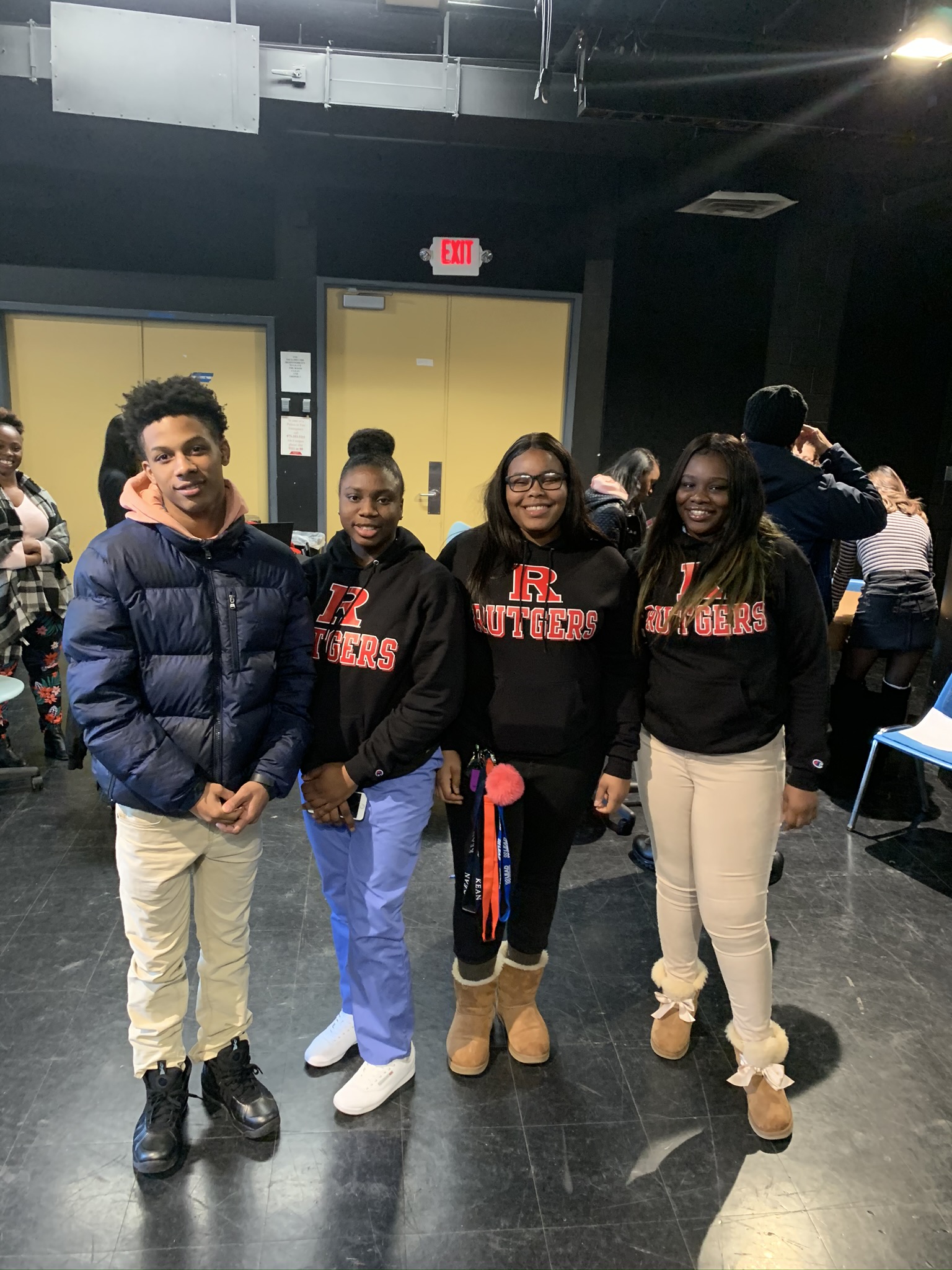Opportunity Youth Network students pose for a photo on their first day of class at Rutgers-Newark (January 21, 2020)
(Newark, NJ) — In its ongoing effort to expand access to dual enrollment, the Newark City of Learning Collaborative (NCLC) has arranged for approximately 90 seats in Rutgers University-Newark’s spring 2020 courses for Newark high school students.
Dual enrollment is a pre-college preparation strategy that allows students to take credit-bearing college courses while still in high school. Among the potential benefits for students who take dual enrollment courses are increased likelihood of graduating high school, enrolling in college, and earning a college degree.
“Dual enrollment at Rutgers University-Newark complements NCLC’s objectives in achieving citywide impact by creating viable college pathways and supporting the development of a consistent college-going culture across all high schools,” said NCLC Executive Director Reginald Lewis.
More than half of the 11th and 12th graders who are taking three-credit courses on campus this spring come from Newark’s 14 public high schools. NCLC brokered the first district-wide agreement between Newark Public Schools and Rutgers University-Newark for the spring 2019 semester.
“Dual enrollment is an incredible opportunity that provides our students with access to a college education while still in high school. This makes them more marketable and prepared when applying to college upon graduation,” said Newark Public Schools Superintendent Roger León. “The credits earned during this experience will give our students a leg up on their peers once they actually attend college. I could not be more proud of our partnership with NCLC and Rutgers-Newark as it continues to bear fruit for our students, our city, and beyond.”
The remainder of Newark high school students participating in dual enrollment at Rutgers-Newark this semester attend Great Oaks Legacy Charter School, the Opportunity Youth Network (YouthBuild Newark and LEAD Charter School), St. Benedict’s Preparatory School, and for the first time, People’s Preparatory Charter School.
Notable about the dual enrollment process at Rutgers-Newark is that high school students attend classes on campus alongside current Rutgers undergraduate students, rather than taking online courses or courses offered on high school premises. Physically being on a college campus is a key element for high school students to envision themselves as college students in the future.
“I am excited about learning how to manage a business and speak more professionally. I believe this course will prepare me for the responsibilities of college and how to manage my time. I am excited to be on campus and immersed in the college experience,” said Abigail Crucey, an 11th grader at Weequahic High School who is taking Leadership for Service Professionals this semester.
While a few students are taking classes at the Rutgers School of Public Affairs and Administration (SPAA), most are taking elective courses at the Rutgers School of Arts and Sciences–Newark (SASN). The two SPAA courses offered to dual enrollment students are Leadership for Service Professionals and a course taught by Lewis, Servant Leadership in the Public Sector. Lewis also serves as an assistant professor of professional practice at SPAA.
Among the SASN courses offered are Principles of Psychology, Race and Ethnicity in the US, Portuguese Literature in English Translation, Everyday Data, History of Newark, and a Colloquium in Arts, Culture, and Media.
“Working with these combined classes is without doubt one of the most rewarding experiences of my college teaching career,” said Ian Watson, Director of the Theatre Program and the Urban Civic Initiative at Rutgers-Newark who teaches the Arts, Culture, and Media Colloquium. “Within the first two to three classes the distinctions between undergraduates and high schoolers has vanished…high school students realize a college career is a genuine possibility for them. The Rutgers students walk away with a better understanding of the community around them and how much they have in common with their fellow citizens who have not had the same opportunities they have had.”
High school students get on-going support throughout the semester to ensure that they are successful in their courses. Both SASN and SPAA have assigned assistant deans to provide academic advisement to the students as they progress in their classes. Students also go through an orientation before the semester starts, a mid-semester check in, and a post-semester focus group to inform future improvements to the program.
Throughout the semester, NCLC primarily serves as a bridge between the schools and Rutgers-Newark staff and faculty, ensuring that parents, school-based staff, and university staff are coordinated in the success of each student.
Housed at the Cornwall Center at Rutgers University-Newark, NCLC’s goal is to ensure that Newark students have the opportunity, information, and access to go to college, afford college, complete college, and ultimately secure gainful employment. Through dual enrollment and other initiatives that equip students to succeed, NCLC helps Newark build and sustain a college-going culture.
For more information about NCLC, visit newarknclc.org.

